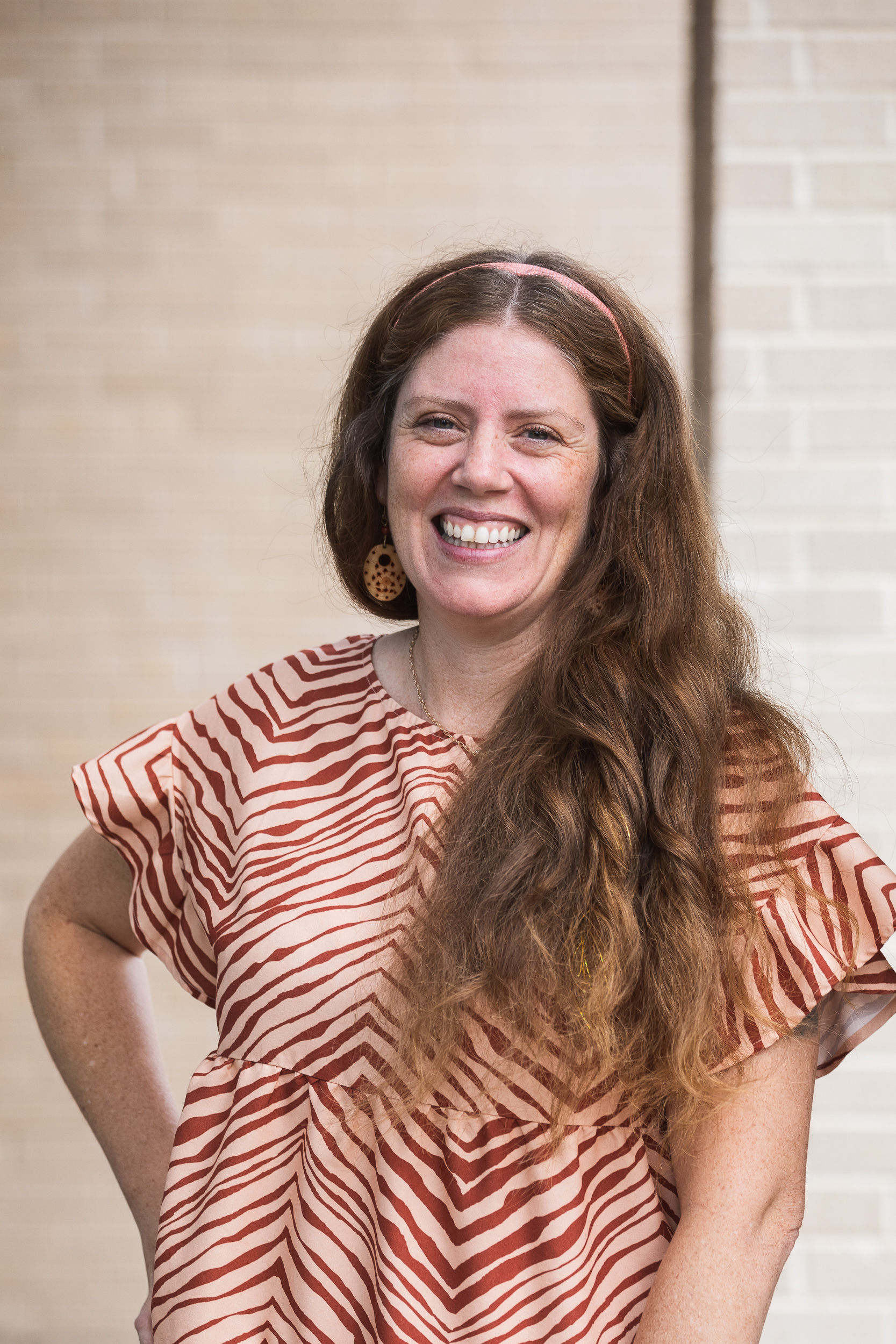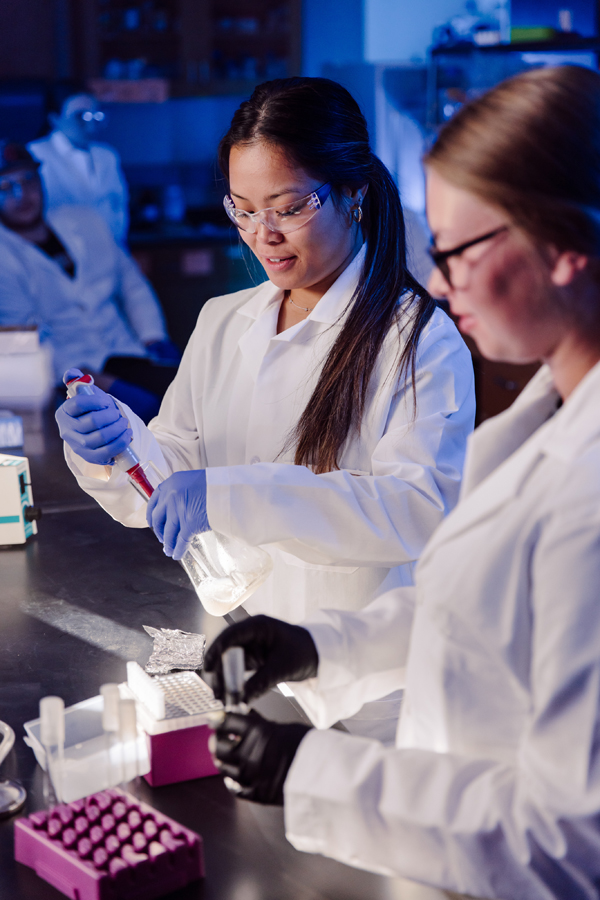
Biochemistry
Biochemistry
From Theories to Solutions.
College of Arts and Sciences
Location: Crete
Degree Type: Undergraduate
Biochemistry is the integration of knowledge from the biological and chemical sciences, among others, leading to the study and application of chemical interactions in living systems.
In addition to building conceptual scientific knowledge, Doane biochemistry students will also develop their quantitative reasoning and communication skills. We put you in the lab, giving you significant experience with equipment, practices and research. There's also a strong emphasis on professional conduct and ethical decision-making. As a biochemistry major at Doane, you'll graduate with the skills necessary to land your first job or excel in graduate school.
Biochemistry isn't just an excellent path to a profession in medicine. It can also lead you to a career in biotechnology, pharmacology, industry or government. At Doane, you'll gain the soft and hard skills necessary to excel, no matter what career path you choose.

Program Information
Career Paths
A biochemistry degree will provide you a generous mixture of biology and chemistry courses designed to help you hit the ground running in your first job or graduate school. Biochemistry majors have gone on to successful careers in healthcare, biotechnology, government, law and more.
Medical and Clinical Laboratory Technologist
2017 Median Pay: $51,770 per year
Job Outlook: +13% over the next 10 years
Medical laboratory technologists (commonly known as medical laboratory scientists) collect samples and perform tests to analyze body fluids, tissue and other substances. Clinical chemistry technologists prepare specimens and analyze the chemical and hormonal contents of body fluids.
Chemists and Materials Scientists
2017 Median Pay: $76,280 per year
Job Outlook: +7% over the next 10 years
Chemists and materials scientists study substances at the atomic and molecular levels and analyze the ways in which the substances interact with one another. They use their knowledge to develop new and improved products and to test the quality of manufactured goods.
Food Scientist
2017 Median Pay: $62,910 per year
Job Outlook: +7% over the next 10 years
Food scientists use chemistry, biology, and other sciences to study the basic elements of food. They analyze the nutritional content of food, discover new food sources and research ways to make processed foods safe and healthy.
Forensic Scientist
2017 Median Pay: $57,850 per year
Job Outlook: +17% over the next 10 years
Forensic science technicians aid criminal investigations by collecting and analyzing evidence. Many technicians specialize in various types of laboratory analysis. Forensic chemists typically use chemicals, laboratory equipment and computers to examine DNA, substances and other evidence collected at crime scenes. They often work to match evidence to people or other known elements, such as vehicles or weapons.
Pharmacist
2017 Median Pay: $124,170 per year
Job Outlook: +6% over the next 10 years
Pharmacists dispense prescription medications to patients and offer expertise in the safe use of prescriptions. They also may conduct health and wellness screenings, provide immunizations, oversee the medications given to patients and provide advice on healthy lifestyles.
Physician and Surgeon
2017 Median Pay: >$208,000 per year
Job Outlook: +13% over the next 10 years
Physicians and surgeons diagnose and treat injuries or illnesses. Physicians examine patients; take medical histories; prescribe medications; and order, perform and interpret diagnostic tests. They counsel patients on diet, hygiene and preventative healthcare. Surgeons operate on patients to treat injuries, such as broken bones; diseases, such as cancerous tumors; and deformities, such as cleft palates.
Dentist
2017 Median Pay: $158,120 per year
Job Outlook: +19% over the next 10 years
Dentists diagnose and treat problems with patients' teeth, gums and related parts of the mouth. They provide advice and instruction on taking care of teeth and gums and on diet choices that affect oral health.
Veterinarian
2017 Median Pay: $90,420 per year
Job Outlook: +19% over the next 10 years
Veterinarians care for the health of animals and work to improve public health. They diagnose, treat and research medical conditions and diseases of pets, livestock and other animals.
Professor
2017 Median Pay: $76,000
Job Outlook: +15% over the next 10 years
Post-secondary teachers instruct students in a wide variety of academic and technical subjects beyond the high school level. They may also conduct research and publish scholarly papers and books.
Lawyer
2017 Median Pay: $119,250 per year
Job Outlook: +8% over the next 10 years
Lawyers advise and represent individuals, businesses, and government agencies on legal issues and disputes. Intellectual property lawyers deal with the laws related to inventions, patents, trademarks and creative works.
Source: bls.gov.
Courses
Faculty and Staff





Special Programs
Health Professions Advisory Committee
A good portion of Doane biochemistry majors plan to pursue a health career. Preparation is very important and involves many areas of campus—students need a strong education in the sciences, excellent communication skills, and a demonstrated interest in service. Advisors in the Health Professions Advisory Committee work with you (in addition to your academic advisor) to help plan your coursework, find shadowing and internship experiences, develop skills for taking entrance exams and find information on the best professional programs for you.
Helena Valquier-Flynn

The Doane Difference

Excellent Advising
One of the most important college experiences is engaging and learning in your classes. At the Doane Learning Center, our students have free access to academic counseling and support to exceed in their studies.

Rich Campus Culture
With over 60 student-led clubs and organizations, including a Student Programming Board that sponsors competitions and guest appearances, our campus is a community – and there is a place for you at Doane.

Affordable Education
We reward students for their achievements both in and outside of the classroom. Through scholarships, grants, work-study, and on-campus employment, our students look forward to starting jobs, not payment plans.

Biochemistry covers the connection between the biological and chemical sciences. Students studying biochemistry will develop a variety of transferable problem-solving skills, gain significant laboratory skills, and learn about a wide range of diverse applications to related fields, such as medicine, pharmacy and forensic science.
Biochemistry is the basis for understanding all biological processes. As such, biochemistry is connected to all disciplines that involve living organisms such as agriculture, biotechnology, forensic science, pharmaceutical science, molecular biology, medicine and all health-related disciplines.
The biochemistry curriculum is built to heavily emphasize students’ time in the laboratory. Biochemistry students at Doane conduct research projects through one-on-one mentorship with a full-time professor. These projects often cover interdisciplinary topics and involve collaboration with faculty outside of chemistry. From this, students gain qualitative and quantitative analytical skills that can be applied to careers in a diverse range of industries, including pharmaceutical, chemical, petroleum, environmental and healthcare, as well as graduate and professional schools.
Biochemistry covers the connection between the biological and chemical sciences. Students studying biochemistry will develop a variety of transferable problem-solving skills, gain significant laboratory skills, and learn about a wide range of diverse applications to related fields, such as medicine, pharmacy and forensic science.
Biochemistry is the basis for understanding all biological processes. As such, biochemistry is connected to all disciplines that involve living organisms such as agriculture, biotechnology, forensic science, pharmaceutical science, molecular biology, medicine and all health-related disciplines.
The biochemistry curriculum is built to heavily emphasize students’ time in the laboratory. Biochemistry students at Doane conduct research projects through one-on-one mentorship with a full-time professor. These projects often cover interdisciplinary topics and involve collaboration with faculty outside of chemistry. From this, students gain qualitative and quantitative analytical skills that can be applied to careers in a diverse range of industries, including pharmaceutical, chemical, petroleum, environmental and healthcare, as well as graduate and professional schools.


